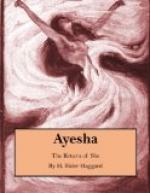One of them, however, rose again and, breaking through our escort of priests, ran to Leo, knelt before him and kissed his hand. It was that young woman whose life he had saved, a noble-looking girl, with masses of red hair, and by her was her husband, the marks of his bonds still showing on his arms. Our guide seemed to see this incident, though how she did so I do not know. At any rate she turned and made some sign which the priest interpreted.
Calling the woman to him he asked her sternly how she dared to touch the person of this stranger with her vile lips. She answered that it was because her heart was grateful. Oros said that for this reason she was forgiven; moreover, that in reward for what they had suffered he was commanded to lift up her husband to be the ruler of that tribe during the pleasure of the Mother. He gave notice, moreover, that all should obey the new chief in his place, according to their customs, and if he did any evil, make report that he might suffer punishment. Then waving the pair aside, without listening to their thanks or the acclamations of the crowd, he passed on.
As we went down the ravine by which we had approached the village on the previous night, a sound of chanting struck our ears. Presently the path turned, and we saw a solemn procession advancing up that dismal, sunless gorge. At the head of it rode none other than the beautiful Khania, followed by her great-uncle, the old Shaman, and after these came a company of shaven priests in their white robes, bearing between them a bier, upon which, its face uncovered, lay the body of the Khan, draped in a black garment. Yet he looked better thus than he had ever done, for now death had touched this insane and dissolute man with something of the dignity which he lacked in life.
Thus then we met. At the sight of our guide’s white form, the horse which the Khania rode reared up so violently that I thought it would have thrown her. But she mastered the animal with her whip and voice, and called out—“Who is this draped hag of the Mountain that stops the path of the Khania Atene and her dead lord? My guests, I find you in ill company, for it seems that you are conducted by an evil spirit to meet an evil fate. That guide of yours must surely be something hateful and hideous, for were she a wholesome woman she would not fear to show her face.”
Now the Shaman plucked his mistress by the sleeve, and the priest Oros, bowing to her, prayed her to be silent and cease to speak such ill-omened words into the air, which might carry them she knew not whither. But some instinctive hate seemed to bubble up in Atene, and she would not be silent, for she addressed our guide using the direct “thou,” a manner of speech that we found was very usual on the Mountain though rare upon the Plains.
“Let the air carry them whither it will,” she cried. “Sorceress, strip off thy rags, fit only for a corpse too vile to view. Show us what thou art, thou flitting night-owl, who thinkest to frighten me with that livery of death, which only serves to hide the death within.”




